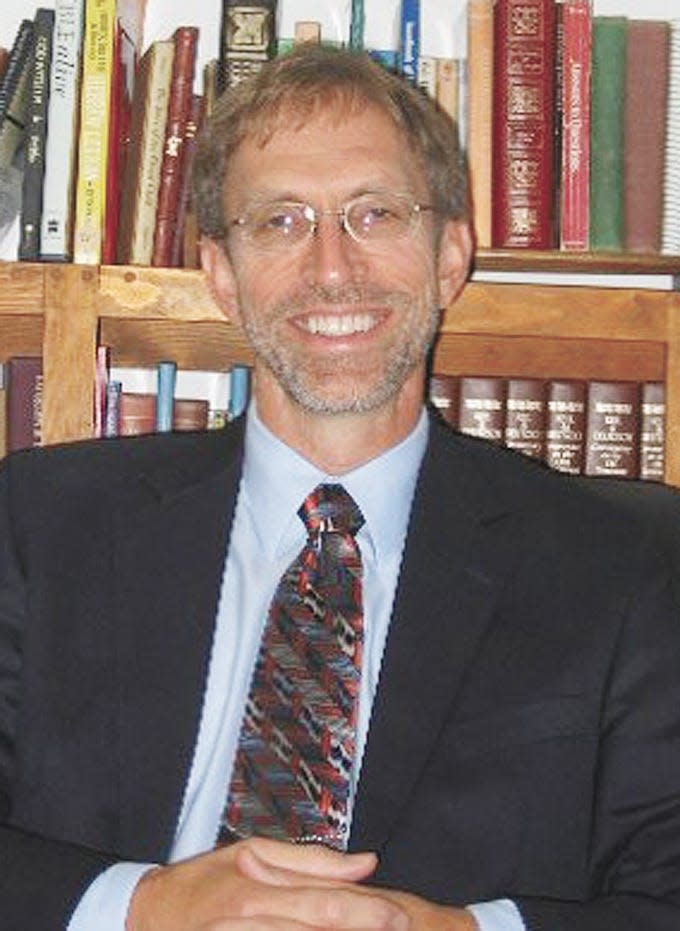Shayne Looper: Scientists long for meaning, too
If I understand him correctly, the theoretical physicist Leonard Susskind, who teaches at Stanford, contends that matter entering a black hole is preserved in the form of data. Should a black hole consume our world, all it’s information — which is in a sense what matter is — will be compressed and preserved on the surface of the black hole’s horizon.
If this is true, it leaves open the door for some advanced alien race to reconstruct everything that has ever existed, including you and me. It is a kind of eternal life that Susskind foresees, and with it, an eternal meaning for the human race.

Susskind is not the only scientist looking for an escape hatch from the heat death of the universe. Freeman Dyson suggested that humans may in the eons to come shed their physical bodies and become, for lack of a better description, thinking, communicating clouds of gas, preserving the universe from collapse.
It is possible that Dyson changed his mind about the survival of human consciousness, for he told science writer John Horgan in 2018 that his 1979 paper had become obsolete. Whether he gave up on his theory or not, one cannot help but wonder if existence as a thinking cloud of gas is all that desirable. We all know people for whom that is a fairly apt description, and no one wants to be them.
Roger Penrose has proposed a new model of the cosmos he calls “conformal cyclic cosmology.” In this model, the dying universe produces a singularity which gives birth to new universes, one after another. This is not unlike Einstein’s and Friedmann’s “oscillating universe,” only Penrose has found a way to preserve the accumulated data of previous universes in leftover cosmic microwave radiation.
David Deutsch of Oxford, a strong advocate of the “Many Universes Theory,” has written: “…unimaginably numerous environments in the universe are waiting out there … Almost any of them would, if the right knowledge ever reached it, instantly and irrevocably burst into … activity…”
Deutsch allows for no final “end of all things,” whether in the hellish heat death of the universe nor in a perfect heaven, for he rejects the idea of completion. Deutsch sees humanity forever at “the beginning of infinity,” which is the title he chose for his 2011 book.
Alan Lightman of MIT owns up to his longing for “eternal youth and constancy,” but calls himself “sentimental.” He writes, “Perhaps I could accept the fact that in a few short years, my atoms will be scattered in wind and soil, my mind and thoughts gone, my “I-ness” dissolved in an infinite cavern of nothingness. But I cannot accept that fate even though I believe it to be true.”
He accepts the fact but not the fate. Something in him, as in Penrose, Dyson, Susskind, and Deutsch — all eminently brilliant people — longs for meaning, “constancy,” eternity. “Accepting the fact” of universal futility does not exempt even a scientist from desiring something else. How odd that this desire, thought by Lightman to have no basis in reality, should be so universal. It has been experienced by people of every religion and by people of no religion throughout history.
One very old explanation for this universal longing, predating even the early theoretical “scientist” Democritus, is that the creator of the universe instilled a longing for eternity into the very fabric of humanity. Thus Solomon, nearly a millennium before Christ, wrote that God has “set eternity in the hearts of people.”
Eternity lies within us, which means that humans are bigger on the inside than on the outside. And because eternity is in our hearts, it doesn’t just call to us from “out there” but from “in here,” from the depths of our souls. We cannot escape it, not even if we are brilliant mathematicians or theoretical physicists, for we cannot escape ourselves.
The call of eternity rings within us, but it originates outside of us. It is our creator who places the call. If we will answer it and be connected to him, we will be connected to eternity, to meaning, and to the source of life itself.
— Find this and other articles by Shayne Looper at shaynelooper.com.
This article originally appeared on Sturgis Journal: Shayne Looper: Scientists long for meaning, too

